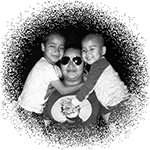On March 25, Jennifer Avalos Barrios, a 24-year-old from Guatemala with two young boys in California, made a panicked call to her sister from an immigration detention center in Jena, Louisiana. “Call my lawyer,” she said, “and tell her I’m suffocating.”
Marlene Seo, a 47-year-old who’s lived in the United States since she was 3, sent texts. “Alex,” she wrote to her daughter through an app, “they just sprayed pepper spray in here and everyone is practically dying from coughing we can’t breathe!!!” The next message was one word: “help!!!”
That morning, officials from GEO Group at Immigration and Customs Enforcement’s LaSalle detention center had assured Avalos Barrios, Seo, and their dorm mates that they were safe from the new coronavirus. Things went awry, and soon 79 women found themselves trapped in a room filled with pepper spray. They were coughing, fainting, crying out for help. It was an hour or so before they got out, Avalos Barrios later told her lawyer, Mariel Villarreal.
I’ve spoken to Avalos Barrios, five dorm mates, a woman who watched things unfold from a neighboring dorm, and many of their loved ones. Most are using their real names, a courageous decision at a time when GEO Group is retaliating against people who speak to the media.
Listen to immigration reporter Noah Lanard reconstruct the ICE pepper-spray attack in detail from interviews with several women in detention, on this episode of the Mother Jones Podcast.
Most of the interviews were done over video calls, with the women sitting in front of a backdrop reminiscent of school photo days—the realities of detention behind them obscured by a cartoonish mountain. The $0.21-per-minute calls occasionally afforded more intimacy than the phone, but they had a tendency to leave faces frozen at unflattering angles. The app we used, called GettingOut, refers to detainees by an unintentionally accurate euphemism: residents.
Even in a pandemic, getting out of the LaSalle “ICE Processing Center” isn’t easy. Nearly 1,100 of the 1,335 beds there were full earlier this month. While ICE has released some people with medical conditions that make them vulnerable to COVID-19, it continues to hold many more in tight quarters that make social distancing impossible.
The new coronavirus has brought tensions in detention centers to new extremes, but what happened on March 25 was months of neglect in the making, and ghoulish in its ironies. This is the story—in the women’s own words—of how a presentation about a virus that attacks people’s lungs culminated in guards in gas masks pulling women out of a toxic room.
Aside from the interviews with Marlene Seo, her daughter, and a woman from a neighboring dorm, what appears below is translated from Spanish. ICE and GEO Group did not respond to requests for comment.

1. Before LaSalle

Marlene Seo: I come from a blended family.
Alex, Marlene’s daughter: It’s surreal. She’s been here her whole life. Her side of the family is all Mexican. My dad is Korean. We never went to Mexico. We never visited her extended family because she was always scared of the cartel stuff.
Marlene: We have five kids and five granddaughters. This was all a shock for me—to be even sentenced to prison time for taxes. [Listen 🔈]

Jennifer Avalos Barrios: I’ve been in the US for three years. I fled Guatemala to seek asylum with my sons. They’re with my sister in California. The older one is 9. The younger one just turned 6 in February. The police arrested me after I got into an accident in Alabama. I lived in San Francisco, but I had relatives in Tennessee.

Kerlys: I’m from Colombia. I left for the capital and later got a job in the US. I was studying to be a medical assistant when I had my first daughter, who’s 7. A friend’s wife asked me to give her an implant. We ordered it from Colombia without seeing if that was allowed here. She had an allergic reaction and had to go to the hospital. The hospital called the police, then the FDA came.
I turned myself in on May 31. It was three hard months. The probation office said I wouldn’t have any issues with immigration. Then they called the next day to say that ICE had placed a detainer. ICE picked me up on August 30 and I got to LaSalle on September 5.
Adelina (a pseudonym): I’m Dominican. I’m 46 years old, and I’ve been in the US for 25 years. I’ve got five kids. I was doing tiling. I worked with a whole team—six, seven, eight, nine people for a big job. I was driving when we got stopped. Immigration status isn’t something I look into. I only care that you show up to work, but I was driving. They arrested me—took the car, my cellphone, my tools, everything. I thought I was going to get a ticket or something.
I have asthma, bad circulation, high blood pressure. But I spent a year fighting a human-trafficking charge from prison. They knew the charge would strip me of my green card. I said in court, “Innocent, innocent, innocent.” A lawyer told me they’d let me out if I pled guilty. I wasn’t getting the medicine I needed. I was having asthma attacks. What do you think I did? The judge said I was free to go. Then ICE grabbed me.
Laura (a pseudonym): I’m from Honduras, and I was living in Nashville. I’m not going to be with my son when he turns 10. When I got arrested, I said my son is asthmatic and he needs me. I said I’ve been living in this country for 15 years. The police didn’t care and called immigration. The immigration officer showed up and showed me a piece of paper. He said, “Do you know what this is? It’s your ticket back to your country.” The only thing I did wrong was coming to this country illegally. I pay my taxes.
I’ve been here for two months and will be waiting for three or four more months to have a bond hearing. [Listen in Spanish 🔈]

Mailenys Hernández Jiménez: I worked in IT in Cuba. My husband and I came to the US on May 5 and turned ourselves in together.
Mailenys’ husband: They separated us. I got sent to Colorado. She got sent to tents in the desert.
Mailenys: I slept on the ground for 50 days and was only allowed to bathe six times. Then I got sent back to Mexico on June 23. On July 24, I crossed the bridge to go to court and told the judge I was afraid of going back to Juárez. I told an asylum officer about everything that had happened. I got back my passport, my phone, and all my things. I asked an official three times if he was sure I was being released. He said yes. I ended up getting sent to LaSalle. After two months, my husband was released with a $5,000 bond. I’ve been going through this for 11 months.

2. “One Little Jar of Soap”
Marlene: The whole immigration process is awful, to say the least. It’s unnecessary to spend so much time in here. The depression it’s causing for people. I’m a very spiritual person. I read self-help books. I know how to stay positive. I know how to stay busy. But I just broke down today. I translate for a lot of people, so they tell me their stories. They confide in me. And it just took a toll on me today.
Yesterday, I found out that my court date was going to be changed again. I just feel like it’s so easy for them to just say “another week, another month,” when they’re not the ones in here and your families are suffering. Families are being torn apart unnecessarily. It’s sad, and it brings you down.
Kerlys: I served three months for a crime. Three months. And now I’m here for an immigration case I could handle from home with an ankle monitor. I wouldn’t be able to go anywhere because I’m on probation. But, no, we’re here in totally inhumane conditions. [Listen in Spanish 🔈]
Marlene: When you walk in, there’s tables here in the front. The beds are in the middle part, and they’re very close together. There’s seven rows. In the very back are the toilets and the showers.
Kerlys: There’s four toilets and six showers for 80 women.
Adelina: There’s only one microwave. Right now, it’s not working.
Marlene: The regular uniform is blue and orange. Blue for low level. Orange for low-medium. It’s like 90 percent blue. The other dorm has yellow and red, so they’re higher security.
Kerlys: On top of everything else that’s happening with the coronavirus, my husband left me three months ago. He said he was tired of taking care of the girls alone, and that he’d met someone else. Eight days ago, he took my daughters to Georgia. I don’t know anything about how my kids are doing, only that they’re with their dad and someone named Mary.
Adelina: I was very sick when I got here. It took two weeks to get medical attention. They thought I was playing games. They said, “Calm down, it’s nothing.” Then a doctor saw me and confirmed I have asthma.
Mailenys: Everything they give you here has flour in it. Everything. They don’t give us fruit. Today’s lunch was bread, mashed potatoes, a sweet roll, and some meat. I have a thyroid condition, so I have to eat well. There’s nothing healthy to buy from the commissary, either.
Marlene: The commissary is expensive—highway robbery for generic brand items. I saw yesterday the powdered milk is $5. It’s just a small bag. Sensodyne toothpaste is $8.10.
The cleaning supplies. I asked even before all of this. I would ask for wipes, and they would tell us we don’t have the funds. I would think that’s odd because you would think a place saturated with so many people would have common things. Then this whole COVID thing happened, and it’s like, “Okay, we really need it now.” They’re telling us we need to have it. And nope, still don’t have it.
Laura: We don’t have enough sanitary pads, soap, and cleaning supplies. They want us to keep things clean, but they don’t give us what we need.
Marlene: Hand soap. We literally had to beg for it. They’re doing a little better now. They handed us these little tubes of soap yesterday. They said they’re going to bring us one every week. When we finish one, we have to show the empty one to get a new one. But for the whole week, one little jar of soap and that’s it. It’s ridiculous.
Kerlys: We have the advantage of having TVs. We have the news on 24/7 because there’s nothing else to do.
Marlene: They don’t understand that I speak English. I kind of eavesdrop on their conversations. One of the officers said today they need to take away our TVs so that we don’t hear the news.
Kerlys: In Aliceville, I didn’t feel like I was in prison. Here, I’ve experienced what it’s really like to be a prisoner.
Marlene: I told them, we’re not criminals. We’re here just for an immigration process. You don’t have to treat us like this. They just think because you don’t speak English or whatever, they just push you along like cattle. “Do this. Do that.”
Kerlys: The guards are always outside the dorm because they’re afraid of being infected. It’s because something is happening outside that we’re not aware of.

3. La Doctora Mentirosa
Jennifer: Someone from GEO came and said that ICE and doctors were going to come and talk to us about coronavirus the next day. They said we’d have the chance to ask questions.
Marlene: They had told us not to ask silly questions. They make you feel stupid. Like, “Don’t ask about their nail polish.” I know they’re trying to joke, but this is not a funny matter.
Kerlys: The official who told us about the meeting said this was our chance to do something because things were ugly outside. She said a lot of them didn’t want to be working but that they had to. She said to only talk about the virus.
Everyone said they’re going to bring in La Doctora Mentirosa—the Lying Doctor. She’s a psychologist, but she’s known as the La Doctora Mentirosa. We don’t know her actual name. We say she’s a liar because she promises things will happen, and they never do. [Listen in Spanish 🔈]
Jennifer: It’s very difficult to talk about what happened on Wednesday, but I’ll tell you. The GEO assistant was wearing red pants, a white blouse with red stripes, and red sneakers.
Kerlys: Everything was super clean. We had our questions ready.
Mailenys: The doctor came with a plan. She was going to tell us what they wanted us to hear. But we were well informed.
Jennifer: The administrator started by introducing everyone: “She’s the doctor, they’re from ICE, he’s the captain.” She said, “I’m in charge of making sure there’s enough soap, that you have cleaning supplies, that everything is clean.”
“Perfect,” we said. “We haven’t had soap for the past few days.” She said, “Send me a request when there’s not enough soap.” Then another woman came back from court, and she said, “You’re the one who bugs me with the requests.”
Then it was the supposed doctor’s turn. She speaks Spanish very well. She said, “I’m here to talk about the coronavirus—how to avoid it, how to stop it from spreading.” She said you have to wash your hands and be more than six feet apart. You don’t have to hug. You can bump elbows.
“Any questions?” she asked. “Of course,” we said.
Laura: The question that stuck with me was one about how we could avoid being in groups of 10 or more if we have people all around us. I remember the doctor saying you have to maintain distance. The woman followed up and said, “How are we going to maintain distance if there are 80 of us?” Then the doctor dodged the question and moved on.
Kerlys: I asked what their plan for avoiding mass contagion was. She ignored me and started answering another question. I raised my hand and said, “Answer my question, please.”
The doctor said to calm down, that we shouldn’t be watching the news because it was pure paranoia. That it was a simple flu. “I have two young daughters at home,” she said. “I wouldn’t be here if it were that serious.” [Listen in Spanish 🔈]
Mailenys: She told us not to worry, that only old people get the coronavirus.
Kerlys: I read. Being in detention doesn’t mean we’re ignorant.
Jennifer: Another woman asked about people who are asymptomatic. She went to someone else. We said, “No. Answer the question.” A lot of women started saying, “You’re not a doctor, you’re a psychologist.”
Marlene: I came back from court and started hearing questions. Then so many people started interrupting. Things started getting out of control. An officer standing in the back said, “If you can’t be civil, we’re going to leave.” He called it off. Everybody got upset.
Kerlys: We hadn’t planned a demonstration or anything like that. That was just something that happened. After they left, we started to chant, “Libertad! Libertad! Libertad!” A Russian woman started yelling, “Freedom! Freedom! Freedom!”
Heather (a pseudonym for a woman in a nearby unit): I heard something about freedom. They were chanting. I’m like, what’s all this noise?
Jennifer: We started talking to them through the glass, saying that the doctor should come back. That they shouldn’t be cowards. We told a guard to open the door. We want to talk to the doctor. The guard got scared. She called a captain, who called another captain. A lot of captains showed up. They opened the door. We came up to the door. The captains pushed us. Some of the women pushed back.
Adelina: She came with a bottle of pepper spray.
Kerlys: One of the girls pushed the administrator, and a few of them took off.
Marlene: A few people got out, and at that point the administrator just started spraying everybody, then pushed the door closed.
Jennifer: It was the GEO administrator who sprayed the pepper spray. It was her, personally, who sprayed us.
Kerlys: An asthmatic woman fell to the floor after getting pepper-sprayed. She sprayed her in the face while she was on the ground.
Jennifer: She sprayed a lot people in the face, including me and a friend who’s asthmatic.
Kerlys: She did it knowing that there were people who’d had asthma attacks a few days ago from bleach they’d used in the bathroom.
Jennifer: She did it without compassion. It doesn’t matter to them that we’re humans.
Marlene: There are a lot of people with respiratory problems. We were choking from the gas. Coughing.
Kerlys: All the sudden, everyone started coughing and rubbing their eyes. It turned into chaos. Everyone coughing. The people had asthma falling on the ground and passing out.
Marlene: We were yelling for them to open the door, and they didn’t open it. Somebody threw something at the window to break it, but you can’t break tempered glass or however these windows are.
Kerlys: We were hitting the glass. Help! Help! We’re suffocating.
Adelina: It hit me in the face, too. I couldn’t see. I went with everyone else to the back. I didn’t know what to do because I’d never experienced something so terrible before. I was looking for air, and there wasn’t air. [Making a gasping sound.] Searching. Searching. It was a horror movie, but it was real. [Listen in Spanish 🔈]
Jennifer: Most of us who were up front had to go back to the bathroom.
Adelina: I saw some people jumping in the shower, so I got in the shower as well, washing from head to toe. But we still couldn’t breathe. A lot of people fainted. We were banging on the glass. Someone passed out by the door looking for air. I threw up blood.
Laura: I went up front because there was an older woman who was coughing. I wanted to help her, but when I got close, the smell of the gas hit me. I had to go back. Someone sat me down and told me to calm down, to breathe, because I couldn’t breathe.
Jennifer: I called my sister and said, “You need to call my lawyer and say I’m suffocating.” My sister said, “Calm down, you’re okay.” I said, “I’m not okay.”
Marlene: I sent a text message to my daughter: They just pepper-sprayed us. Everybody’s choking, gagging, throwing up. “Help,” is what I said.
Alex: My heart just dropped. She wanted me to call the cops, so I called the cops for their area. They didn’t do anything. They just said I needed to call the ICE processing center. They gave me attitude and said if I had a problem I should file a complaint online. [Listen 🔈]
Marlene: They came back in wearing gas masks. They were only pulling out the people who were really sick. “Bring her over here!” They were standing by the door. They didn’t want to go and get them. Then they closed the door again.
Heather: It was seeping through the door. When the door opened, the spray came inside. Everybody started coughing and coughing.
Jennifer: They said the rest of us would remain inside. We said no because we were all choking.
Marlene: They shut the door for an hour.

4. “The Animals Get Airtime, and the Immigrants Don’t”
Jennifer: They sent us to the yard, along with some of the other dorms near ours because the spray got into all the rooms.
Marlene: They took us outside, single file. They had us sit down by the fence.
Jennifer: Five captains, two guards, and two from ICE.
Marlene: They counted us all and started treating people who were really bad. They were pouring water on gauze so anybody could wipe their face. They were pointing people out who were involved. I think they told this one girl they were going to question her. She said no, no, no.
Mailenys: She’s tiny. Very skinny.
Jennifer: They told her she was the leader. We said, “There’s not a leader here. We’re all united. We all need answers to the questions we asked. We need the doctor to come back.” The doctor didn’t come back. Three men from GEO threw the woman to the ground. They put their knees on my friend’s back. If they’d pulled harder, they would have broken her arm. It was bent back.
Marlene: It took like a few people to hold her down. The men had their knees on her back. They took her, and all I remember is the way that they were holding her in handcuffs, with her hands way above her head. They were just dragging her.
Jennifer: The captains picked her up by the arms like she was an animal. [Listen 🔈]
Laura: I cried seeing how they treated her. She’s a human being, a woman. I felt very sad for her and scared they might do the same thing to me.
Marlene: Then they brought us all back inside. They came in, turned on the vents, and opened a window. The air was blowing in, and [they] just kind of let it run for the rest of the day to get the smell out of here. And that was it.
Laura: Six or seven people got here last night. They said they hadn’t been tested. Nothing. We don’t know if they might be infected. Now they’re with us.
Marlene: Everybody’s problem is that they keep bringing people in. It’s like, do you not get it? We’re already scared as it is. Louisiana is a high point of extreme contamination.
Laura: How can they not have some heart and release us so we can fight our cases from outside? We’re mothers. With everything that’s happening right now with the coronavirus, why don’t they let us out?
Kerlys: If the virus gets in here, it’s going to be chaos. We’re all going to get sick.
Marlene: We hear what’s on the TV. We hear all the rules that are being applied out there, but not in here. We’re being forgotten. They had this whole episode about animals and shelters. What about immigrants? The animals get airtime, and the immigrants don’t. [Listen 🔈]
Kerlys: They treat us like animals, but there are officials who are good, who are excellent, who are sweet. I work in the laundry. Monday to Friday, I make $3 a day washing the men’s clothes.
There’s a woman in charge whose last name is Garden. In Spanish, garden is jardín. I call her Señora Jardín. She tells me things are horrible out there. I don’t understand why they don’t let you out—to go home and be with your families—because we don’t know when this will end.

5. Getting Out
Not long after these conversations, ICE reported that a detainee at the detention center had tested positive for COVID-19. On Tuesday evening, it reported two more cases.
Late last week, Jennifer was granted a bond of $10,000. Her relatives, left without work by the coronavirus, could afford to pay only about half of it. Villarreal, her attorney, frantically secured the rest from nonprofit bond funds. They were in a race against time. The plan was to get Jennifer out before her final hearing on Tuesday.
On Saturday, Jennifer’s sister, brother-in-law, and two kids set off from California’s Bay Area at 6 a.m. When I reached her sister on Monday, she told me they’d gotten on the road at 3 a.m. after dropping the boys off at their grandmother’s place in Rome, Georgia. They were on track to complete in 60 hours a nearly 3,000-mile drive that takes 44 hours if done nonstop. At 10:17 p.m. on Monday, with Jennifer released and back in cellphone range, I got a call.
The voice on the other end—the “hola” that stretched out into two long syllables of joy—had new life to it. I asked how she was doing. Jennifer’s response was succinct: “I’m happy to be out of that hell.”

















